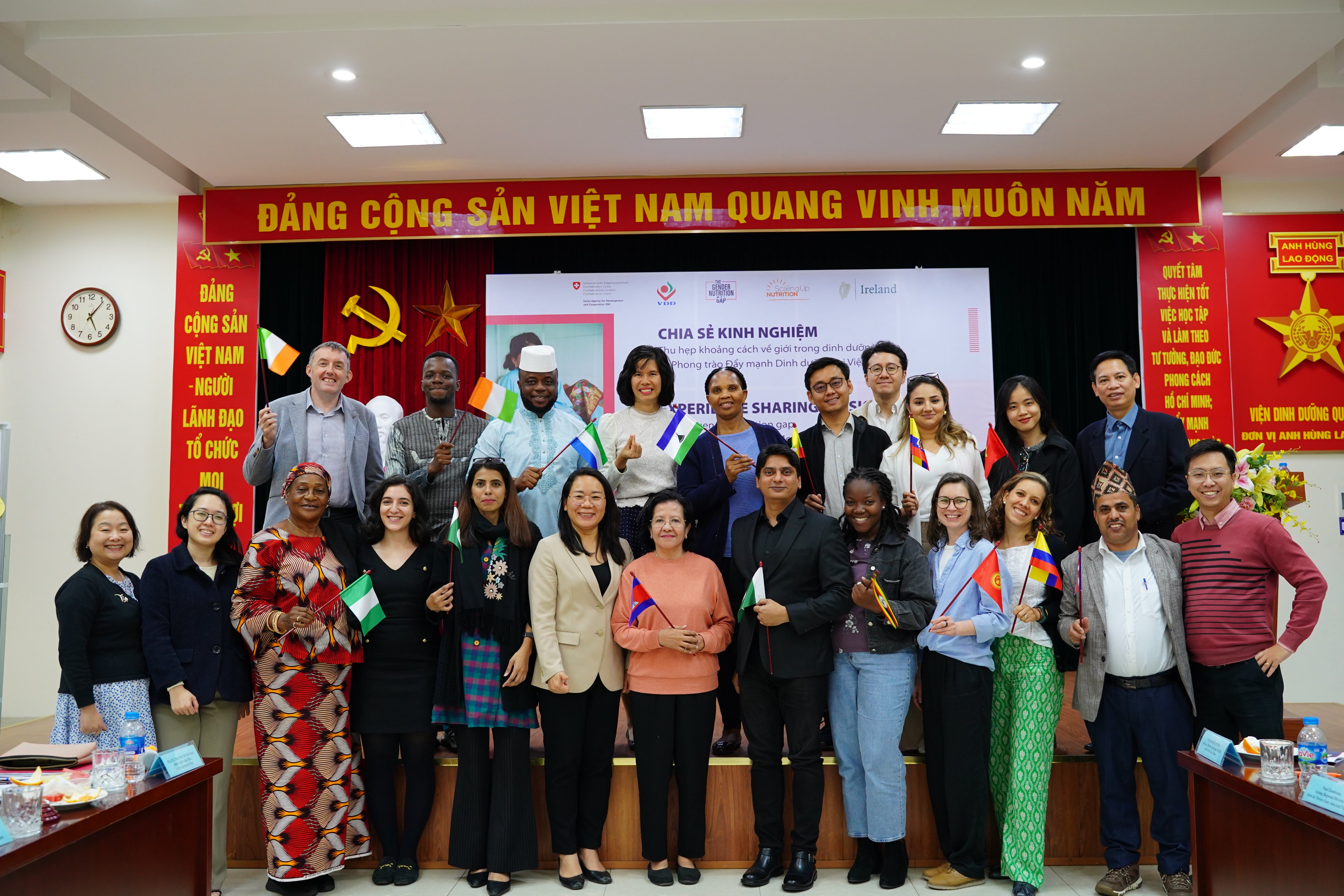Delegates from 15 countries visit nutrition models in Viet Nam and commit to closing gender nutrition gap for women and girls
This press release was drafted by the Viet Nam National Institute of Nutrition (VDD), SUN Civil Society Network, The Gender Nutrition Gap, The Swiss Agency for Development and Cooperation; and the Government of Ireland.
Hanoi, January 13, 2024 - On the occasion of commemorating the 10th anniversary of joining the Scaling Up Nutrition (SUN) Movement, Viet Nam National Institute of Nutrition was honored to welcome a delegation from 15 countries to learn about nutrition models and share commitments to close the gender nutrition gap for women and girls.

The gender nutrition gap is both a complex and simple concept: consider who tends to be the last to eat in a family. Even in normal circumstances, our mothers and grandmothers often sacrifice for us and other family members, taking the less appetizing or smaller portions. Therefore, during food shortages, women and girls may suffer even more,” emphasized Dr. Paul Zambrano, Acting Regional Director, Alive & Thrive East Asia Pacific, FHI 360. FHI 360 led the development of global action agenda to Close Gender Nutrition Gap which has been endorsed by more than 40 organizations.
UNICEF’s recent report revealed that over one billion women and girls worldwide are facing malnutrition and its severe consequences,” Ms. Do Hong Phuong, Nutrition Policy Specialist, UNICEF Viet Nam, informed. The lack of access to nutrition and comprehensive healthcare services for pregnant women and mothers of young children doesn't just affect one generation, it has long-term effects on their children's physical health and the future of nations.
January 2024 marks the 10-year milestone since Viet Nam joined the global SUN Movement launched by the United Nations,” stated Mr. Tran Thanh Duong, Director General of the Viet Nam’s National Institute of Nutrition, at the event. “Over the past decade, nutritional issues have received the directive attention and investment from the government. Despite notable achievements, such as reducing the stunting rate to below 20% and doubling the exclusive breastfeeding rate from 19% to 45%, significant nutritional disparities persist within ethnic minority communities, particularly among women and girls. The government is actively addressing this challenge by financing for nutrition in all three National Targeted Programs.
As part of the National Targeted Program for socio-economic development in ethnic minority and mountainous areas, by 2025, Viet Nam aims to ensure that over 80% of pregnant women from ethnic minority groups receive regular prenatal check-ups, give birth at healthcare facilities, or receive assistance from healthcare professionals. Additionally, there is a commitment to enhancing nutritional support for 100% of malnourished children in ethnic minority and mountainous regions.
Mr. Doseba Sinay, National Director of World Vision International in Viet Nam, said, "The member organizations of the SUN Civil Society Alliance in Viet Nam, operating in over 40 provinces, are working closely to provide technical assistance for the Ministry of Health and provinces to establish and sustain effective nutrition models such as Nutrition Club, Little Sun franchised nutrition counseling clinic, Center of Excellence for Breastfeeding, and Human Milk Bank. These contribute to ensuring equitable and quality access to nutrition for mothers and girls, especially in ethnic minority areas."
We are impressed by Viet Nam's progressive policies to close gender nutrition gap, such as extending maternity leave from four to six months and the recent proposal to expand maternity entitlements to female workers in the informal sector,” according to Ms. Nazgol Kafai-Golahmady, Senior Impact and Evidence Adviser, Scaling Up Nutrition Civil Society Network Secretariat. “Viet Nam's prohibition of advertising breast milk substitutes is an important measure to ensure optimal early nutrition for both infants and mothers.
Mr. Seán Farrell, Deputy Head of Mission at the Embassy of Ireland in Viet Nam, emphasized, "Three important pillars of Ireland's foreign policy are improving nutrition, tackling hunger, and promoting gender equality. We believe that supporting and empowering women and girls is not only a fundamental human rights issue but also an absolute key to achieving the sustainable development goals.